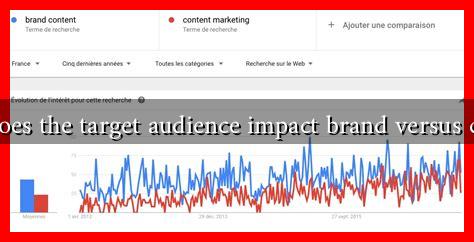-
Table of Contents
- How Does the Target Audience Impact Brand Versus Content?
- The Importance of Knowing Your Audience
- Brand Identity: Shaped by Audience Perception
- Content Strategy: Tailored to Audience Needs
- Case Studies: Successful Brand and Content Alignment
- Statistics That Highlight the Impact of Audience Understanding
- Conclusion: The Interplay Between Brand and Content
How Does the Target Audience Impact Brand Versus Content?
In the ever-evolving landscape of digital marketing, understanding the target audience is paramount. The relationship between brand and content is intricately tied to the audience’s preferences, behaviors, and demographics. This article explores how the target audience influences the dynamics between brand identity and content strategy, providing insights and examples to illustrate these concepts.
The Importance of Knowing Your Audience
Before diving into the brand versus content debate, it’s essential to grasp why knowing your audience is crucial. A well-defined target audience allows brands to tailor their messaging, tone, and content formats to resonate with specific groups. This understanding can lead to increased engagement, loyalty, and ultimately, conversions.
Brand Identity: Shaped by Audience Perception
Brand identity encompasses the visual elements, messaging, and overall perception of a brand. It is not solely defined by the company but is significantly influenced by how the target audience perceives it. Here are some key factors:
- Demographics: Age, gender, income, and education level can shape how a brand is perceived. For instance, a luxury brand targeting affluent consumers will adopt a different tone and aesthetic compared to a budget-friendly brand aimed at college students.
- Psychographics: Understanding the values, interests, and lifestyles of the target audience can help brands create a more relatable identity. Brands like Patagonia resonate with environmentally conscious consumers by aligning their identity with sustainability.
- Feedback and Engagement: Brands that actively engage with their audience through social media or surveys can adapt their identity based on real-time feedback. For example, Nike often adjusts its marketing strategies based on consumer reactions to campaigns.
Content Strategy: Tailored to Audience Needs
Content is the vehicle through which brands communicate their identity and values. The target audience significantly impacts content strategy in several ways:
- Content Type: Different audiences prefer different types of content. For example, younger audiences may favor short-form videos on platforms like TikTok, while older demographics might prefer in-depth articles or podcasts.
- Messaging and Tone: The language and tone used in content should reflect the audience’s preferences. A brand targeting millennials might use a casual, humorous tone, while a B2B company may adopt a more formal approach.
- Distribution Channels: Knowing where the target audience consumes content is crucial. Brands must choose the right platforms—be it social media, blogs, or email newsletters—to effectively reach their audience.
Case Studies: Successful Brand and Content Alignment
Several brands have successfully aligned their identity and content strategy with their target audience:
- Glossier: This beauty brand has built its identity around community and inclusivity. By leveraging user-generated content and engaging with its audience on social media, Glossier has created a loyal customer base that feels personally connected to the brand.
- Coca-Cola: Coca-Cola’s “Share a Coke” campaign personalized its product by featuring popular names on bottles. This strategy resonated with consumers, leading to a significant increase in sales and brand engagement.
- HubSpot: As a leader in inbound marketing, HubSpot tailors its content to meet the needs of marketers and business owners. By providing valuable resources like blogs, eBooks, and webinars, HubSpot has established itself as a trusted authority in the industry.
Statistics That Highlight the Impact of Audience Understanding
Research shows that understanding the target audience can lead to significant improvements in marketing effectiveness:
- According to a study by HubSpot, companies that prioritize audience segmentation see a 760% increase in revenue.
- A report from Statista indicates that 54% of social media users use these platforms to research products before making a purchase.
Conclusion: The Interplay Between Brand and Content
In conclusion, the target audience plays a critical role in shaping both brand identity and content strategy. Brands that take the time to understand their audience can create more effective messaging, foster deeper connections, and ultimately drive better business outcomes. By aligning brand values with audience expectations and preferences, companies can navigate the complex landscape of digital marketing with greater success. The interplay between brand and content is not just a marketing strategy; it’s a pathway to building lasting relationships with consumers.

